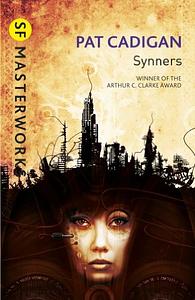Take a photo of a barcode or cover
It does take a little bit to get used to the futuristic slang. The first page may be a little daunting if you aren't a fan of the type of storytelling where the fictional technology is not explained until long after the words are first used. Don't give up! It will make sense eventually.
Cadigan's world is intriguing, but her attempts to immerse the reader in it by throwing every concept at them all at once is confusing, and I can't help but think that this all could have been done better as a short story collection (this idea was only strengthened by the overabundance of viewpoint characters I struggled to differentiate from each other). She tries to thread the needle by having characters deal with commonplace problems, but if that's the main source of the drama then why was it necessary for the setting to be so confusing that the book's first third is effectively exposition?
I saw some glimpses of interesting ideas in Cadigan's world-building, but I never saw a good reason why she couldn't have zeroed in on them in a series of more controlled stories. I dunno. I'm open to the possibility that I whiffed on this one.
Another thing that bugs me is there's so much swearing. I'm not offended or anything, but it's just over the top - is it really necessary? It, too, became distracting.
I never really figured out what the year is supposed to be, unless I missed it somehow, so couldn't reflect on how much "future" had happened. And I didn't really connect with any of the characters, maybe because it seemed like there were too many protagonists - that's probably why it started to feel boggy, and not worth the effort to finish.
The story follows multiple characters and starts with a twist:
"I'm going to die," said Jones.
The statuesque tattoo artist paused between the lotuses she was applying to the arm of the space case lolling half-conscious in the chair. "What, again?"
The following first third of the book introduces a number of diverse characters (with unusual for the time strong female cast), who are (in no particular order): a musical video producer, young and old hackers, a producer of interactive immersing games, based on old movies, several musicians, a low rank manager, ready to kill in order to advance, a sentient AI. Because the reader falls in the midst of the story, it moistly reads as ‘wtf is happening?’
As story progresses we, readers get a better understanding what’s going on and there is an interesting mix of great predictions and errors that seem obvious. The most glaring inconsistency is an absence of web search engine, like Google now and AltaVista in 1995. Yes, the web itself was announced in 1990 and first web-searchers appeared in 1993 but search function was used earlier both on local computers and pre-WWW networks. Instead in the book they crawl through directory trees. The strongest prediction is user-generated video content (think YouTube).
From reviews here on GR many reviewers were impressed by the ending and upped their ratings due to it. For me it was yes, unusual, but nothing extraordinary. To evade spoilers there is a lengthy adventure in virtual reality that constantly reshapes earlier memories and experiences of the characters, a bit like [b:Elysium|23374690|Elysium|Jennifer Marie Brissett|https://i.gr-assets.com/images/S/compressed.photo.goodreads.com/books/1413941458l/23374690._SY75_.jpg|42932369]. The concept is interesting but I wasn’t enamored with execution.
"They might yet. 'Truth is cheap, but information costs.' I can't remember who said that."
"Vince What's-His-Name," said Sam. "Died in a terrorist raid or something. I thought you said all information should be free."
"It should. It isn't. Knowledge is power. But power corrupts. Which means the Age of Fast Information is an extremely corrupt age in which to live."
"Aren't they all?" Sam asked him.
He smiled his dreamy little smile at her. "Ah, but I think we're approaching a kind of corruption unlike anything we've ever known before, Sam-I-Am. Sometimes I think we may be on the verge of an original sin."
"TV and more TV. It looks like something out of an old movie," Sam said. "Forty, fifty years ago, they were always dragging out the TV screens when they wanted to show what the glorious future would look like. As if the future was just going to be more TV."
They'd be cut off from the rest of the world. Sam couldn't remember a time in her life when that had ever happened before; twenty-four hours a day every day for almost eighteen years, she had been within arm's reach of outside contact; the idea of not having anything made her feel claustrophobic, and she said so.
"I've never thought of it that way," Fez told her. "Though I must admit, I've felt antsy since the dataline went down. It bothers me that I can't press a button and check on the rest of the world, or at least the small parts of it that I'm interested in. I'm not the only one. You haven't been able to walk around and see it, dear, but the irritability threshold around here is lower than it used to be. We're not in our natural habitat anymore. We've become denizens of the net. Homo datum."
"Synners."
This is another early cyberpunk work - I seem to be having a couple of months where classics like this are appearing in my to-read queue! Pat Cadigan writes beautifully, and she brings more to the individual characters than many of the other early cyberpunk authors. See this insight into the mind of one of the lead characters:
She had the guilts over the coffee even as she couldn’t wait to drink half of it at one gulp. Modern life was making her sick by trying not to make her sick.
The underlying theme is our interactions with our technology - how much do we change for it, as opposed to changing it to work better for us. Gabe, the protagonist, is a "synner" - a synthesizer, who can take images from the brains of artists and spin them into a media package suitable for mass consumption. Here he is, spinning off down this thread when he's standing in front of a vending machine, and someone says he looked like he might need a few coins for it:
‘Ah. I thought you looked like you needed, um, change for the machines.’ Gabe shrugged self-consciously; he could feel the entire common room watching. The man’s smile was unexpectedly broad and sunny. ‘That’s a good way to put it. How did you know?’ Gabe had the sensation of going over a mental speed bump. ‘Excuse me?’ ‘My whole life has been, “Okay, change for the machines.” Every time they bring in a new machine, more change.’
In this future, a new technology - called sockets - is emerging, which allows people to plug themselves directly into the "dataline" - what we might call the Web. Synners who can do this become vastly more capable, and more commercially valuable. But is it dangerous? - what if there are monsters out there?
Neurons start firing in patterns over and over, and if they’re bad patterns, well, that’s too bad. You people got no shields. You put in sockets, but you forgot about the watchdogs and the alarm systems and the antivirals and the vaccines.
Reality isn't out there, it turns out, it's in our heads. The line for Gabe and his friends becomes increasingly blurred, and the action increasingly frenetic. Great stuff, from one of the founders of cyberpunk.
I have to admit that cyberpunk has never really been my thing, and I rather bounced off Synners (short for "synthesisers", people who have allowed their brains to be surgically augmented with devices that allow them to interface directly with computers. It was written in 1991 so the tech has dated rather badly; and I found the proliferation of characters and scene setting, and the fact the the plot doesn't really start until half way through, difficult to engage with. I've greatly enjoyed Pat Cadigan's recent short fiction, but this didn't work for me.





